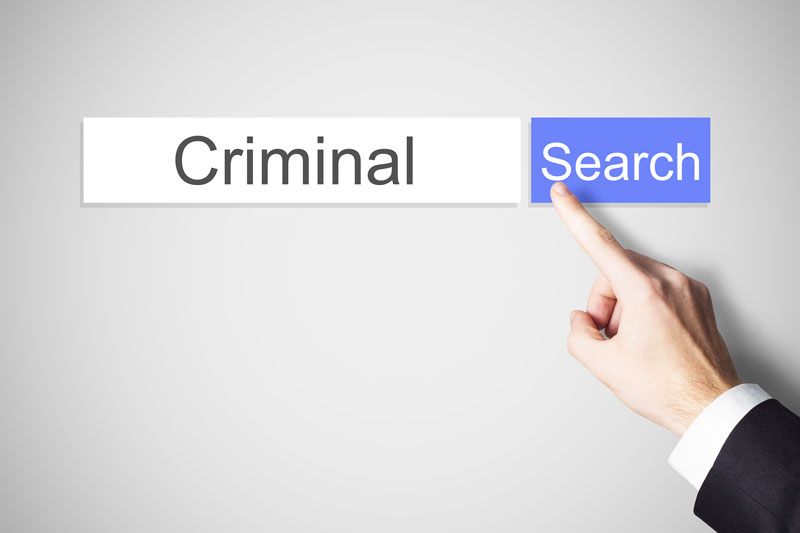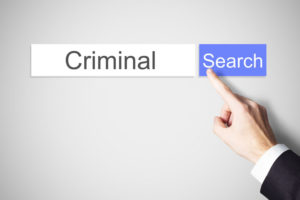
Back to Basics, Blog, Resources
 Editor’s Note: We’re excited to announce our new “Back to the Basics” series, wherein we’ll take an in-depth look at some of the ins and outs of the background check industry. We’re starting off this week with a behind the scenes view of criminal research featuring one of our in-house researchers, Chelsea Swartz.
Editor’s Note: We’re excited to announce our new “Back to the Basics” series, wherein we’ll take an in-depth look at some of the ins and outs of the background check industry. We’re starting off this week with a behind the scenes view of criminal research featuring one of our in-house researchers, Chelsea Swartz.
The sun is beaming and a breeze blows by as Chelsea and Sabrina Schnetzer, Social Media Specialist, step into a courthouse in Kentucky. The police officers there see Chelsea every day and greet her by name.
Sabrina is here to job shadow Chelsea Swartz, Criminal Research and Document Retrieval Specialist, for the day. They walk into the courthouse and go through a metal detector, head up three flights of stairs, and turn a corner. They arrive at the public access terminal with a few computers at desks.
What is a public access terminal?
A public access terminal is a service provided by the courts, for litigants and the public to access dockets, case reports, and other documents filed in county courts. These terminals are located inside each county courthouse. Citizens can typically search by name and date of birth for criminal records on any individual at these courthouse public access computers.
Although you would think that most public access terminals are accessed electronically, there are actually still some out there that are clerk-based. A clerk is an officer of the court whose main responsibility is to maintain records of the court. Counties that require clerk-based criminal research typically have processes that include providing a list of names to be searched and then waiting days or weeks for them to return the results. Some counties even still use ledger books or microfilm to store court records.
Criminal Record Database Search
From there, Chelsea sits down at one of the public access terminal computers and begins to work. She pulls out her list of applicants she received earlier that day and starts typing the names into the criminal records search. On a typical day, Chelsea may have around 300 applicant names to run criminal background checks on.

If Chelsea finds a criminal record in one of her searches, she makes a note of it. From there, she will write down information about the case including the case number, disposition date, filing date, charge description and sentencing information.
Chelsea transcribes case information from the criminal records database into our system, so it is readily available for our in-house team. The case information is then sent to quality assurance where they mark it complete and make it available to our clients. Sometimes cases need more information that is not accessible online, so Chelsea copies physical files from the court records and brings them into our office.
Did you know?
Did you know that each county has its own criminal records database, which is more accurate and up to date than the state’s criminal database? County criminal databases are more precise than the state’s, because cases are tried at the county level and then passed on to the state at their leisure.
SELECTiON.COM® has a nationwide network of court researchers in order to complete the thousands of requests we receive in a day. Since we are located in Cincinnati, our local clients get the added benefit of our in-house research team. We have employees who physically go into the county courthouses in Ohio, Kentucky and Indiana.
We hope you enjoyed seeing a behind the scenes of a day in the life of Chelsea, criminal researcher extraordinaire. Stay tuned to read more “Back to the Basics” articles.
Contact us today to see how SELECTiON.COM® can improve your background check process.

Blog, Resources
 by Wayne J. Jung
by Wayne J. Jung
When I started in the background check business, one of the first things I learned was that no “silver bullet” reporting solution exists.
Which I understood to mean, despite the use of an overused analogy, that there wasn’t one single report that provided all of the necessary data to properly assess an applicant’s candidacy with near certain accuracy, especially as it related to criminal background checks.
And that is part of the reason why at SELECTiON.COM® we offer more than 35 unique reports, a solid half-dozen of which are specifically criminal background check-related.
Why so many, you ask?
Criminal records and sex offender registries are not reported across state lines. In many cases, they aren’t reported up to the state level either.
State background check reports, including fingerprint-based state reports, oftentimes don’t include criminal records from the counties within their own state. This happens because the crimes are tried at the county level, and depending upon the type of offense, the counties are not required to report all records.
In the case of fingerprint background checks, some records, such as misdemeanor drug offenses, public intoxication and disorderly conduct, can be missed simply because the crime is a ticketed offense in that area and doesn’t require being fingerprinted in the first place.
As I mentioned last week, there is no universal reporting methodology and the FBI database is reliant solely upon what state and local agencies choose to report.
The best solution is to not depend solely on one source expecting to return a 100 percent accurate and thorough criminal background report.
We recommend utilizing a Social Security Trace Report to create a residency history, from which our national network of researchers scour the available records in the specific counties in which the applicant has lived.
From there, Search America® provides a snapshot in order to fill in the gaps by pulling data from more than 1500 sources in the United States and abroad.
The Search America® database aggregates information from Administrative Office of the Courts, Departments of Correction, Sex Offender Registries, as well as county court record information from cooperating jurisdictions.
This search also pulls from a large list of national security and international sources, including INTERPOL’s Most Wanted List and the Office of Foreign Assets Control (OFAC) terrorist watchlist.
The combination of a SELECTiON.COM® proprietary Search America® database report and our nationwide network of criminal researchers equals the most comprehensive applicant criminal check in the industry.
Almost as important as providing thorough reporting in an expeditious fashion, is returning accurate data allowing our clients to make the most informed decisions possible.
Our experienced Quality Assurance team of knowledgeable researchers helps ensure you aren’t overwhelmed with false hits, or forced to make decisions based upon faulty data.
The FBI doesn’t have a method allowing applicants to challenge the results, unlike FCRA-regulated consumer reports such as those provided by SELECTiON.COM®, a process that is designed to protect job applicants from unfair employment actions.
And that’s important, because as we have all learned from the recent Robins v. Spokeo, Inc. ruling, consumers may be able to bring FCRA claims in federal court whenever their reports contain inaccurate information, unless that information is truly insignificant.
At SELECTiON.COM® we pride ourselves in being thorough, timely, and above all, accurate.
See for yourself, please call me today at (800) 325-3609, extension 3024.
SOURCE: Robins v. Spokeo, Inc., 867 F.3d 1108 (9th Cir. 2017)

Blog, Resources
 According to The Integrated Automated Fingerprint Identification System (IAFIS), which is maintained by the FBI, there are currently 78-million subjects in its criminal master fingerprint file.
According to The Integrated Automated Fingerprint Identification System (IAFIS), which is maintained by the FBI, there are currently 78-million subjects in its criminal master fingerprint file.
When you take into consideration that slightly more than one in three American adults has a criminal record, that number seems low. Especially when you consider that over the past 20 years authorities have made more than a quarter of a billion arrests, according to the FBI.
America now houses roughly the same number of people with criminal records as it does four-year college graduates. In fact, the number of Americans with criminal records today is larger than the entire U.S. population in 1900.
All of this isn’t meant to disparage the use of fingerprints as part of any company or organization’s background check process, because it is absolutely true that the use of fingerprints for identity verification does have its advantages.
For one thing, fingerprint data is unique and cannot be falsified.
However, the associated information is oftentimes inaccurate or incomplete. That’s especially true as it relates to case dispositions, because many records submitted to the FBI don’t report the court’s final ruling.
A big part of the problem is that there is no universal reporting methodology and local regulations vary. Thus, the FBI database is reliant solely upon what state and local agencies choose to originally report.
That is why at SELECTiON.COM® we always recommend a thorough approach to your pre-employment discovery and background check procedure.
We bundle reporting based specifically upon the needs of our clients, combining granular criminal reporting from the actual counties of residency and the most complete national criminal database in the industry.
Next week, we’ll talk about our Search America™ product and the benefits that it brings to any criminal history reporting. If you can’t wait until then, I’ll be happy to talk to you right now. Call me at (800) 325-3609, extension 3024.
SOURCES:
“Fbi — Iafis”. Fbi.gov. 1999-07-28. Archived from the original on 2012-09-21. Retrieved 2012-09-14.
Fields, G., & Emshwiller, J.R. “As Arrest Records Rise, Americans Find Consequences Can Last a Lifetime.” The Wall Street Journal, 18 Aug. 2014. Web.
Friedman, Matthew. “As Many Americans Have Criminal Records As College Diplomas.” Web blog post. Just Facts. Brennan Center for Justice at New York University School of Law, 17 Nov. 2015. Web.

Blog, Resources
 by Thomas Wright, Satisfaction Executive
by Thomas Wright, Satisfaction Executive
SELECTiON.COM®
The Consumer Financial Protection Bureau (CFPB) has been in the news a lot recently with its first and only director, former Ohio Attorney General Richard Cordray, stepping down the day after Thanksgiving and announcing his intent to run for Ohio Governor.
Created in large part because of the 2008 recession and accompanying housing bubble, the CFPB is still a fairly new government agency by any standard.
It’s not surprising, then, that many Americans, although having heard the name, still don’t know what the CFPB does.
So, let’s take a slightly deeper dive.
According to the CFPB website, the bureau’s primary task is “to provide a single point of accountability for enforcing federal consumer financial laws and protecting consumers in the financial marketplace” from potential wrongdoing by banks, credit lenders, brokerages, insurance companies, etc.
Designed to “protect consumers from unfair, deceptive, or abusive practices” by acting against companies that break the law, CFPB records show that it has helped more than 29-million consumers secure nearly $12-billion in relief as of July 20, 2017.
To date, the Consumer Financial Protection Bureau has handled more than 1.2-million complaints.
The six core functions of the CFPB include:
- Rooting out unfair, deceptive, or abusive acts or practices by writing rules, supervising companies, and enforcing the law
- Enforcing laws that outlaw discrimination in consumer finance
- Taking consumer complaints
- Enhancing financial education
- Researching the consumer experience of using financial products
- Monitoring financial markets for new risks to consumers
As a background check company tasked with assembling consumer credit or other consumer information for the purpose of furnishing reports to third party clients, SELECTiON.COM® is required to operate under the guidelines of the Fair Credit Reporting Act (FCRA)
Under law, the consumer has the right to know that a background report is being compiled as part of their application, that no search will be conducted without their approval and to see what is in these reports upon their conclusion.
Maintaining the accuracy of collected data is also required and the CFPB, acting in its capacity has the regulatory arm of the FCRA, has ruled in multiple instances against consumer reporting agencies that failed to take basic steps to assure the information reported about job applicants was accurate.
At SELECTiON.COM® we are always monitoring our security and our accuracy to provide our customers with complete, timely, secure and accurate results. We are fully FCRA compliant and can help our customers maintain their compliance at the click of a button.
CFPB, CRA, FCRA…it may all seem like alphabet soup and it might not even be important to most consumers. That is, until they get passed over for the job or home of their dreams.
Then, it just may be a job for the Consumer Financial Protection Bureau.
If you’d like to know more about the CFPB, or the results we provide for our clients and our applicants, please contact us today.
SOURCES: https://www.consumerfinance.gov/

Blog, Resources
 by Brian Huseman, Satisfaction Executive
by Brian Huseman, Satisfaction Executive
SELECTiON.COM®
How does your hiring process account for data security?
With the recent surge in security breaches at companies like Equifax, Yahoo, Verizon and Uber, just to name a few, it may be past time for your company to review how the personal information that you share is handled by your partners.
According to the Code of Federal Regulations (CFR), personally Identifiable Information (PII) is any detailed data that can be used to distinguish or trace an individual’s identity, either alone or when combined with other personal or identifying information that is linked or linkable to a specific individual.
PII, simply put, must be securely handled to ensure that it does not fall into the wrong hands.
Examples of PII that must be secured include the following:
- Social Security Number (SSN)
- Date of Birth with Name
- Home Address
- Driver’s License Number
- Even a partial SSN, if it is shown along with Name and/or Address
Some immediate areas that should be reviewed are:
- Who needs to see it?
- What needs to be seen?
- Can the sensitive information be communicated securely?
Interoffice communications are some of the primary targets of hackers and consideration must be given to the information that is required to communicate effectively.
In addition, storage of PII should only be done within secure systems with limited access to non-essential personnel and should always provide a record of who is accessing the information.
At SELECTiON.COM® we take data security very seriously.
Secured Login, Computer Generated Passwords, Multiple Firewall Protection and Encrypted Email are just some of the measures utilized to secure your sensitive data.
SELECTiON.COM® personnel are put through ongoing training in handling client data and effective communications.
Access to information is limited to only the personnel that hold the highest security clearance and regular audits are conducted to identify areas that may require additional attention.
Our client’s privacy and data security are paramount to us and we are unyielding in our efforts to protect the information with which we are entrusted.
Contact us today to see how SELECTiON.COM® works to protect you and your client’s data.
NOTE: The contents of this article are not legal advice for your particular situation. You should neither act nor rely upon anything stated in this article without first consulting your own legal counsel.

Blog, Resources
 Knowing the background of your applicant can be your greatest indicator of their ability to do their job. Unfortunately, criminals aren’t going to just give you their records or tell you where they committed their crimes. In fact, there are a few tricks that criminals employ to actively HIDE that information from you.
Knowing the background of your applicant can be your greatest indicator of their ability to do their job. Unfortunately, criminals aren’t going to just give you their records or tell you where they committed their crimes. In fact, there are a few tricks that criminals employ to actively HIDE that information from you.
SOME OF THE TRICKS:
- Commit crimes after passing the background check.
- Give a False Name
- Move Around From State To State.
If you’re a client of SELECTiON.COM®, you’re in good hands. We’ve been in the background screening industry for over 25 years and offer all of the necessary tools to deal with the many different ways criminals try to hide records.
SELECTiON.COM® SOLUTIONS
Quarterly Watch®
SELECTiON.COM® owns the nation’s largest criminal database (Search America® Report) searching over 1 BILLION records. Once your applicant’s information is entered into our system, we will run our Quarterly Watch® product which includes Sex Offender Registry, Government Watch lists and Correction Records throughout the U.S. This way, you will be alerted as soon as possible with any additional records.
SSN Trace and Validation
First the SSN is ran through the SSA and then the SSN is traced which gives residence and identity history associated with the given SSN. If the name given by the applicant does not match the SSN Report, this can be a red flag to the client.
Criminal County Research
Fingerprinting and State Reports might be missing other criminal records. Depending on the offense, not all county records are reported to the state level. Furthermore, some records, such as public intoxication, disorderly conduct and misdemeanor drug offenses could be missed because the crime is a ticket offense that doesn’t require fingerprinting.
County research is the most accurate and up-to-date source of criminal history. Crimes are tried on a county level. SELECTiON.COM® researches the counties based of the SSN Trace Report, not where the applicant has told you they live.
Contact SELECTiON.COM® today to see how we can keep your workplace safe.

 Editor’s Note: We’re excited to announce our new “Back to the Basics” series, wherein we’ll take an in-depth look at some of the ins and outs of the background check industry. We’re starting off this week with a behind the scenes view of criminal research featuring one of our in-house researchers, Chelsea Swartz.
Editor’s Note: We’re excited to announce our new “Back to the Basics” series, wherein we’ll take an in-depth look at some of the ins and outs of the background check industry. We’re starting off this week with a behind the scenes view of criminal research featuring one of our in-house researchers, Chelsea Swartz.

 by Wayne J. Jung
by Wayne J. Jung
 According to The Integrated Automated Fingerprint Identification System (IAFIS), which is maintained by the FBI, there are currently 78-million subjects in its criminal master fingerprint file.
According to The Integrated Automated Fingerprint Identification System (IAFIS), which is maintained by the FBI, there are currently 78-million subjects in its criminal master fingerprint file.
 by Thomas Wright, Satisfaction Executive
by Thomas Wright, Satisfaction Executive
 by Brian Huseman, Satisfaction Executive
by Brian Huseman, Satisfaction Executive
 Knowing the background of your applicant can be your greatest indicator of their ability to do their job. Unfortunately, criminals aren’t going to just give you their records or tell you where they committed their crimes. In fact, there are a few tricks that criminals employ to actively HIDE that information from you.
Knowing the background of your applicant can be your greatest indicator of their ability to do their job. Unfortunately, criminals aren’t going to just give you their records or tell you where they committed their crimes. In fact, there are a few tricks that criminals employ to actively HIDE that information from you.